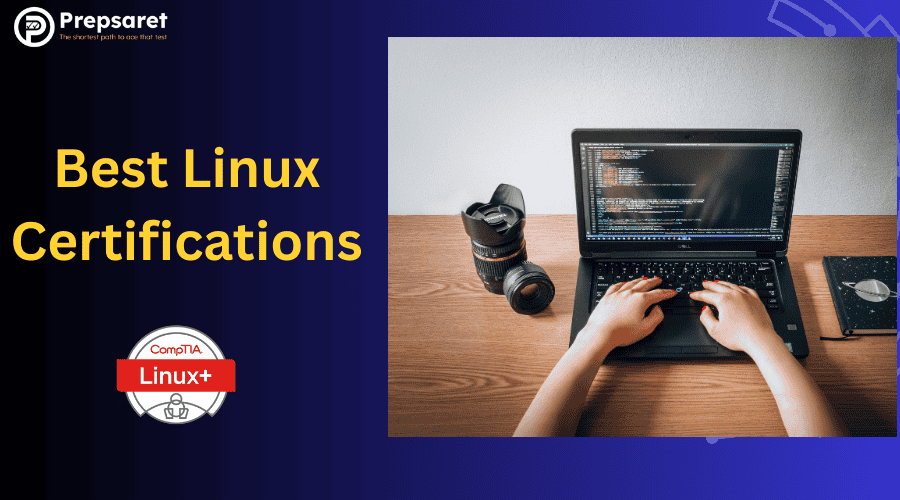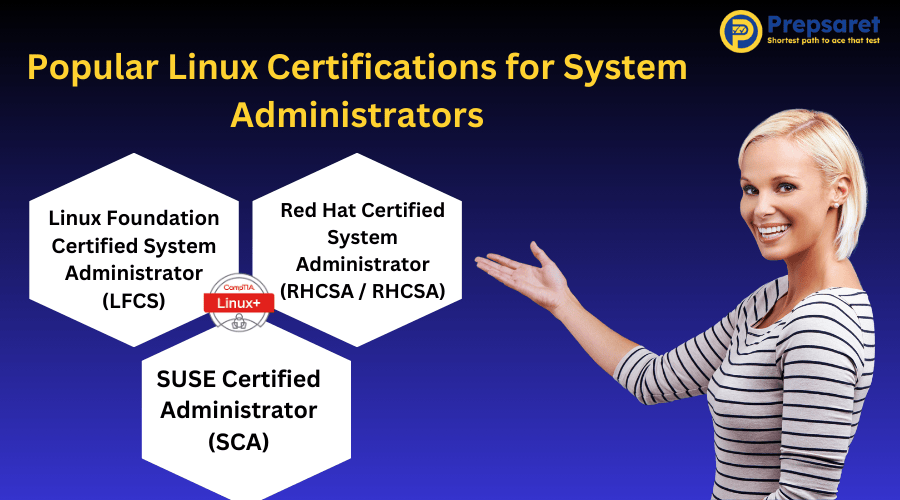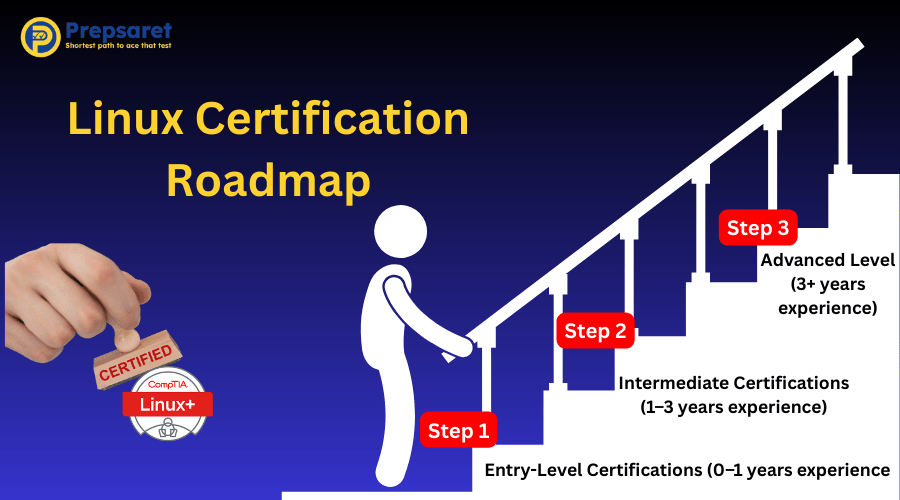The best Linux certifications open doors to rewarding IT career certifications and growth opportunities in today’s tech-driven world. Linux skills are essential for system administrators, developers, and IT professionals managing servers and cloud infrastructure.
To advance your career, selecting the right Linux certification programs and Linux certification training is crucial.
This article will guide you through the best Linux certifications available, covering training options, costs, and career benefits.
For those preparing for the CompTIA Linux+ exam, Prepsaret stands out as the top website offering comprehensive study materials to help you succeed.
Why Linux Certifications Are Important for IT Careers
Linux certifications have become increasingly valuable in today’s IT landscape. Here’s why these IT career certifications are crucial for your professional growth:
High Demand for Linux Skills:
- Over 96% of the world’s top one million web servers run on Linux
- Cloud computing platforms predominantly rely on Linux-based systems
- Enterprise organizations use Linux for mission-critical applications
- The Internet of Things (IoT) ecosystem is built primarily on Linux foundations
Career Advancement Opportunities:
- Linux server administration roles offer excellent growth potential
- DevOps and cloud engineering positions require strong Linux foundations
- System administrator roles consistently rank among the top IT careers
- Security professionals benefit significantly from Linux expertise
Salary Potential:
- Linux-certified professionals earn 20-30% more than their non-certified peers
- System administrators with Linux certifications command higher salaries
- Cloud architects with Linux expertise are among the highest-paid IT professionals
- DevOps engineers with Linux skills are in extremely high demand
Investing in Linux certification training not only validates your expertise but also opens doors to immediate career opportunities and long-term professional security. These certifications demonstrate that you can manage, secure, and optimize Linux environments, making you a valuable asset in any IT organization.
Entry-Level Linux Certifications: Your First Step
For those new to Linux, starting with entry-level Linux certifications is the best way to build a strong foundation.
These certifications introduce essential Linux concepts, command-line skills, and basic system administration practices, preparing you for more advanced roles. Here’s why they matter and what to consider:
Why Entry-Level Linux Certifications Are Valuable:
- Provide a structured path for beginners to learn Linux fundamentals
- Enhance credibility when applying for IT roles that require Linux knowledge
- Build confidence with hands-on practice through labs and exercises
- Serve as a stepping stone to advanced certifications and higher-paying roles
Popular Linux Certifications for Beginners:
- CompTIA Linux+ – Vendor-neutral, ideal for foundational Linux skills
- LPIC-1 (Linux Professional Institute Certification) – Focuses on essential Linux administration tasks
- Linux Foundation Certified System Administrator (LFCS) – Covers core system administration across distributions
Linux Learning Options and Costs
Linux certification courses are widely available online and in-person, offering flexible training options. Many platforms provide Linux certification free tutorials and practice exams to help reduce Linux certification cost.
Beginners can refer to a Linux certification list to compare programs, exam content, and prerequisites.
Starting with the best Linux certifications for beginners ensures you gain relevant skills without feeling overwhelmed. With proper guidance and structured learning, these certifications set you up for success in IT roles requiring Linux expertise.
Popular Linux Certifications for System Administrators
For IT professionals aiming to manage servers and networks, obtaining specialized Linux administration certification is essential. These certifications validate skills in Linux server administration and prepare candidates for roles such as system administrator, network engineer, and cloud operations specialist. Below are some of the top certifications for system administrators.
Linux Foundation Certified System Administrator (LFCS)
The LFCS certification is performance-based and designed to test essential Linux system administration skills. It focuses on practical, real-world tasks rather than only theoretical knowledge.
Key Details:
- Covers system configuration, user and group management, file system administration, networking, security, and troubleshooting
- Exam lasts about 2 hours, taken online with proctoring
- Cost: Approximately $395
- No prerequisites, making it accessible to professionals with relevant Linux skills
These certification matters because:
- Provides hands-on experience managing Linux systems
- Validates ability to troubleshoot, configure, and secure Linux environments
- Recognized globally by employers seeking skilled Linux administrators
Red Hat Certified System Administrator (RHCSA / RHCSA)
The RHCSA is highly respected in the IT industry and focuses on Red Hat Enterprise Linux (RHEL) administration. It is often a prerequisite for advanced Red Hat certifications.
Key Details:
- Covers essential administration tasks including SELinux, container management, and advanced system setup
- Emphasizes hands-on, practical skills applicable to enterprise environments
- Offers strong career advancement potential and higher salary prospects
Why It Matters:
- Enhances employability for Red Hat-focused roles
- Demonstrates expertise in enterprise-grade Linux administration
- Provides a clear pathway to more advanced certifications like Red Hat Certified Engineer (RHCE)
SUSE Certified Administrator (SCA)
The SCA targets SUSE Linux Enterprise Server administration and emphasizes practical, hands-on skills.
Key Details:
- Focuses on system installation, configuration, and management
- Ideal for enterprises using SUSE Linux products
- Validates essential Linux system administration capabilities
Why It Matters:
- Demonstrates ability to manage and troubleshoot SUSE Linux systems
- Boosts career prospects in organizations using SUSE products
- Offers industry recognition for Linux administration expertise
These Linux administration certification programs validate system administrator capabilities in managing Linux environments, maintaining security, and troubleshooting effectively.
By earning these best Linux certifications for system administrators, IT professionals gain practical experience, credibility, and opportunities for long-term career growth.
Advanced Linux and DevOps Certifications for Experienced Professionals
For experienced IT professionals and Linux users, advanced certifications provide specialized skills that go beyond basic system administration.
These certifications are designed for individuals aiming to excel in DevOps environments, cloud computing, and enterprise-scale Linux management.
Earning these credentials demonstrates expertise in complex Linux systems, automation, and emerging technologies.
Red Hat Certified Engineer (RHCE)
The RHCE is an advanced Red Hat certification for professionals who have already earned the RHCSA. It focuses on automation and enterprise-level Linux administration.
Key Details:
- Covers advanced system configuration, automation with Ansible, and troubleshooting complex environments
- Strong emphasis on practical, hands-on skills
- Ideal for senior Linux administrators, DevOps engineers, and system architects
Why It Matters:
- Positions professionals for leadership roles in Linux administration and DevOps
- Enhances earning potential and career advancement opportunities
- Recognized globally for enterprise Linux expertise
Linux Foundation Certified Engineer (LFCE)
The LFCE is the advanced certification offered by the Linux Foundation for professionals looking to specialize in Linux networking, system services, and enterprise administration.
Key Details:
- Focuses on advanced networking, system services, and management across Linux distributions
- Exam is performance-based and emphasizes practical skills
- Prepares candidates for enterprise and DevOps roles requiring in-depth Linux knowledge
Why It Matters:
- Demonstrates the ability to handle complex Linux systems and enterprise-scale infrastructure
- Strengthens credibility in DevOps, cloud, and senior system administration positions
DevOps-Focused Linux Certifications
Several certifications bridge Linux expertise and DevOps certifications, ideal for engineers integrating Linux with automation and cloud tools. Examples include:
- Certified Kubernetes Administrator (CKA): Focuses on container orchestration in Linux environments
- Docker Certified Associate: Demonstrates containerization skills critical for DevOps pipelines
- Advanced Linux certifications for DevOps: Combine automation, scripting, and system orchestration
Why They Matter:
- Provide skills for modern infrastructure management in DevOps and cloud environments
- Boost employability and open doors to high-paying, in-demand roles
- Position professionals as experts in integrating Linux with advanced DevOps workflows
Earning advanced Linux certifications and the best Linux certification for DevOps equips IT professionals with technical expertise, hands-on experience, and industry recognition.
These certifications are highly valued in enterprise, cloud, and DevOps roles, making them a critical step for career growth in modern IT.
Check Out: CompTIA Linux+ Certification Courses
Comparing Top Linux Certifications: Features and Job Market Trends
When deciding which Linux certification to pursue, it’s essential to understand the key features of each program and their impact on job prospects and salary potential.
Below is a detailed comparison of some of the most popular certifications:
| Certification | Key Features | Job Roles | Salary Potential (USD) | Why Choose It? |
| CompTIA Linux+ | Vendor-neutral, covers fundamental Linux skills | Junior sysadmin, Linux technician | $60,000 – $85,000 | Great for beginners, broad industry recognition |
| LPIC-1 / LPIC-2 (Linux Professional Institute) | Multi-level; covers entry to advanced Linux topics | System Administrator, DevOps | $70,000 – $100,000 | Respected open-source certification with career paths |
| Red Hat Certified System Administrator (RHCSA) | Red Hat-specific, hands-on, enterprise-focused | System Administrator, Linux engineer | $80,000 – $115,000 | Top choice for Red Hat environments; high employer demand |
| Linux Foundation Certified System Administrator (LFCS) | Performance-based; distribution-flexible | Sysadmin, Linux engineer | $75,000 – $110,000 | Practical skills tested, works across multiple distros |
Which Linux Certification is Best for Jobs?
The answer depends on your career goals and the type of employers you’re targeting. For beginners or professionals seeking broad applicability, CompTIA Linux+ or LPIC-1 provide an excellent foundation.
Those targeting enterprise environments or Red Hat-specific systems will benefit most from RHCSA, which is highly valued and often serves as a gateway to advanced Linux roles. The LFCS certification offers credibility for roles requiring versatile Linux skills across different distributions.
Many of these programs are recognized among the top 10 best Linux certifications in the industry today. They also represent Linux certifications with high salary potential, helping professionals secure competitive salaries and accelerate career advancement.
Choosing the right certification ultimately depends on your current skills, career aspirations, and the Linux technologies required for your desired role. Selecting wisely ensures that your certification aligns with both professional growth and market demand.
Find Out: What jobs can you get with CompTIA Linux+ certification?
Linux Certification Cost and Cheapest Options
When planning to pursue Linux certifications, understanding the Linux certification cost is crucial to budget your time and resources effectively. Certification expenses generally include exam fees and, optionally, training courses, which can vary depending on the provider.
| Certification | Key Features | Job Roles | Salary Potential (USD) | Why Choose It? |
| CompTIA Linux+ | Vendor-neutral, covers fundamental Linux skills | Junior sysadmin, Linux technician | $60,000 – $85,000 | Great for beginners, broad industry recognition |
| LPIC-1 / LPIC-2 (Linux Professional Institute) | Multi-level; covers entry to advanced Linux topics | System Administrator, DevOps | $70,000 – $100,000 | Respected open-source certification with career paths |
| Red Hat Certified System Administrator (RHCSA) | Red Hat-specific, hands-on, enterprise-focused | System Administrator, Linux engineer | $80,000 – $115,000 | Top choice for Red Hat environments; high employer demand |
| Linux Foundation Certified System Administrator (LFCS) | Performance-based; distribution-flexible | Sysadmin, Linux engineer | $75,000 – $110,000 | Practical skills tested, works across multiple distros |
Affordable Options and Cost-Saving Tips
- Many organizations and training platforms offer Linux certification free tutorials, practice exams, and study guides
- Entry-level certifications like CompTIA Linux+ and LPIC-1 are more affordable while providing strong career value
- Advanced certifications such as RHCSA and LFCS carry higher fees but deliver premium value for professionals targeting enterprise or specialized Linux roles
- Planning certifications in phases—starting with entry-level programs and progressing to advanced credentials—helps manage costs effectively
Considering exam fees, training investments, and career outcomes, LPIC and CompTIA Linux+ stand out as affordable entry points, whereas Red Hat and Linux Foundation certifications offer high industry value and better alignment with enterprise-level roles.
Strategically choosing your certifications can maximize return on investment while advancing your IT career.
How to Prepare for Linux Certification Exams Effectively
Preparing for Linux certification exams requires a structured approach that combines theory, hands-on practice, and reliable study resources.
With proper preparation, candidates can confidently tackle the Linux certification exam and build the practical skills needed for real-world IT roles.
Step 1: Choose the Right Certification and Training
Selecting the right certification depends on your experience level and career goals. Entry-level candidates may start with CompTIA Linux+ or LPIC-1, while experienced professionals may pursue RHCSA, LFCS, or DevOps-focused certifications.
Once chosen, enroll in quality Linux certification training, either online or in-person, that aligns with the exam objectives.
Step 2: Utilize Structured Study Materials
- Leverage official exam guides, documentation, and video tutorials from trusted providers
- Use interactive labs to practice Linux server administration, configuration, and troubleshooting
- Platforms like Prepsaret offer comprehensive study materials specifically for CompTIA Linux+, including practice questions, simulations, and step-by-step tutorials
Step 3: Practice Hands-On Skills
Hands-on experience is crucial for Linux certification exams, especially performance-based ones like LFCS or RHCSA. Focus on:
- Managing users, groups, and permissions
- Configuring filesystems, storage, and networking
- Writing basic shell scripts and automating tasks
- Securing Linux systems and troubleshooting common issues
Step 4: Take Practice Exams
- Regularly attempt practice exams to identify knowledge gaps
- Review incorrect answers thoroughly to reinforce learning
- Simulate exam conditions to improve time management and reduce anxiety
Step 5: Join Study Groups and Online Communities
Engaging with others preparing for Linux certifications can boost learning:
- Participate in forums, Discord groups, Facebook Groups, or Reddit communities focused on Linux certifications
- Share tips, discuss complex topics, and gain insights from experienced professionals
- Collaborate on lab exercises to reinforce practical skills
Structured preparation, combined with consistent hands-on practice, ensures readiness for real-world Linux roles and long-term career growth.
Linux Certification Roadmap
A well-planned Linux certification roadmap helps IT professionals progress systematically from beginner to expert while maximizing career growth opportunities.
Step 1: Entry-Level Certifications (0–1 years experience)
For newcomers, foundational certifications build essential Linux skills and credibility:
- Linux Foundation Certified IT Associate (LFCA)
- CompTIA Linux+
- LPIC-1 (Linux Professional Institute Certification Level 1)
Step 2: Intermediate Certifications (1–3 years experience)
Once you gain practical experience, intermediate certifications deepen your system administration expertise:
- Linux Foundation Certified System Administrator (LFCS)
- Red Hat Certified System Administrator (RHCSA)
- LPIC-2 (Linux Professional Institute Certification Level 2)
Step 3: Advanced Level (3+ years experience):
Advanced certifications target senior roles, DevOps, and enterprise-level responsibilities:
- Red Hat Certified Engineer (RHCE)
- Certified Kubernetes Administrator (CKA)
- Linux Foundation Certified Kubernetes Security Specialist (CKS)
Specialization Paths:
- DevOps Track: Automation, containers, and orchestration
- Security Track: System hardening and security management
- Cloud Track: Combine Linux skills with cloud certifications
- Architecture Track: Design and planning expertise
This roadmap provides flexibility, ensuring a solid foundation while allowing specialization in areas aligned with your career goals.
Following it systematically enhances employability, skill mastery, and long-term success in IT.
The Role of Open Source Certifications in Career Growth
Open source technologies, particularly Linux, form the backbone of modern IT infrastructure. Earning open source certifications demonstrates a professional’s ability to manage, secure, and optimize Linux and related systems, making them highly valued in today’s job market.
Benefits of Open Source Certifications:
- Career Advancement: Certified professionals are often considered for system administrator, DevOps, cloud engineer, and security roles.
- Credibility: Certifications validate hands-on skills and knowledge, signaling to employers that candidates can handle real-world challenges.
- Versatility: Open source certifications, such as CompTIA Linux+, LPIC-1, RHCSA, and LFCS, provide skills that apply across multiple Linux distributions and enterprise environments.
- Higher Salary Potential: Professionals with open source credentials often command higher salaries due to their specialized expertise and practical experience.
Industry Recognition:
Organizations increasingly rely on Linux-based systems for servers, cloud platforms, containers, and networking infrastructure. Open source certifications serve as proof of competence, helping professionals stand out in competitive IT job markets.
Find Out: Is CompTIA Linux+ Worth It?
Best Linux Certifications: FAQs
Is Linux+ Or RHCSA Better?
Linux+ is vendor-neutral and great for beginners, covering broad Linux skills. RHCSA focuses on Red Hat Enterprise Linux with hands-on tasks and is more valued in organizations using Red Hat, making it better for specialized sysadmin careers.
How Hard Is CompTIA Linux+?
CompTIA Linux+ is moderately difficult, suitable for those with basic Linux knowledge. It covers system management, security, automation, and troubleshooting, with a mix of multiple-choice and performance-based questions, typically rated 4-6 out of 10 in difficulty.
Is CompTIA Linux+ For Beginners?
Yes, CompTIA Linux+ is designed for beginners and entry-level IT professionals. It provides a strong foundation in Linux administration, security, and scripting, making it a solid choice to start your Linux certification journey.
Which GIAC Certification Is The Best?
The best GIAC certification depends on your cybersecurity focus. Popular ones include GIAC Security Essentials (GSEC) for general security and GIAC Certified Incident Handler (GCIH) for incident response, both offering strong industry recognition.
Does Coursera Work On Linux?
Yes, Coursera works on Linux since it is web-based. You can access Coursera courses, watch videos, and complete assignments using any modern Linux web browser without compatibility issues.
Conclusion: Choosing the Best Linux Certifications for Your IT Career
Pursuing the best Linux certifications strengthens your skills, boosts credibility, and opens doors to high-demand IT roles.
Whether starting with entry-level Linux certifications or advancing to enterprise-level credentials, take action today—prepare with trusted Prepsaret study materials to confidently pass your exams and accelerate your IT career.




